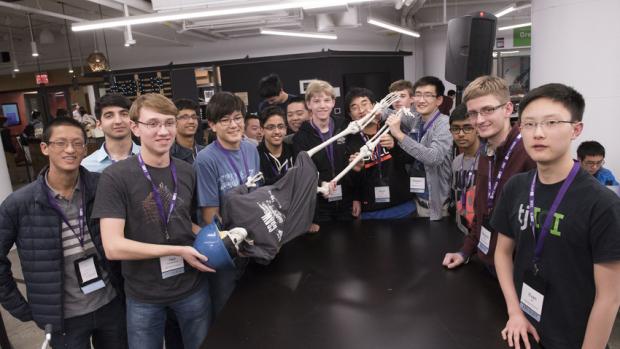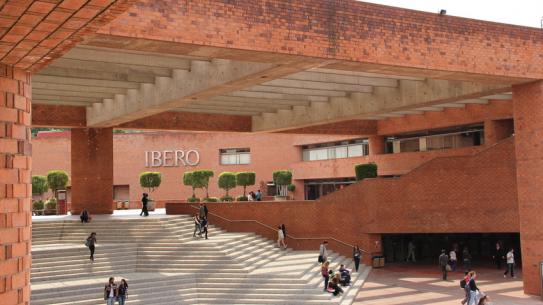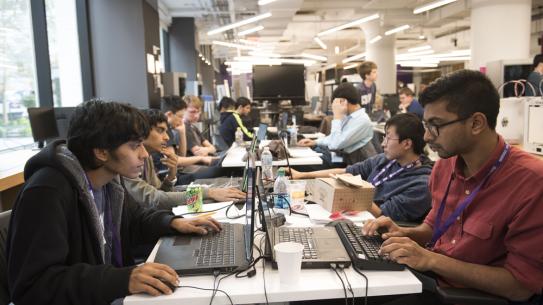Mexico, Tunisia Join the World’s Largest Student-Led Cybersecurity Event
Registration Open for CSAW Preliminaries in Six Regions Worldwide as Competition Founded by NYU Tandon Enters 15th Year

Participants in last year's Cyber Security Awareness Worldwide (CSAW), the world’s largest student-run cybersecurity competition.
BROOKLYN, New York, Wednesday, August 29, 2018 — The world’s largest student-run set of cybersecurity competitions, founded 15 years ago by the New York University Tandon School of Engineering, will expand this year to Mexico and Tunisia, bringing to seven the number of global sites where top student hackers, protectors, and scholars will compete simultaneously on November 8-11, 2018.
New Cyber Security Awareness Worldwide (CSAW) events, which are designed by students under the mentorship of information security professionals and faculty, will address security threats in areas such as 3D printing as well as IoT – the so-called Internet of Things — in which an estimated 80 percent of connected devices are vulnerable to a wide range of attacks and security spending may reach $1.5 billion this year.
Since its inception in 2003, CSAW has drawn nearly 100,000 high-school, college, graduate and post-graduate students to compete. This year the world’s best information security students will attend final rounds of competition in:
- Universidad Iberoamericana in Mexico City (Ibero), for finalists from that country
- Higher School of Communication of Tunis (Sup’Com), Ariana, Tunisia, for finalists from the Middle East and North Africa
- The new hubs of IBM Research-Haifa and the University of Haifa for Israeli finalists
- Ben-Gurion University of the Negev in Beer Sheva, returning for Israeli finalists
- Grenoble INP – Esisar, in Valence, France, for European finalists
- The Indian Institute of Technology in Kanpur, India (IIT Kanpur)
- NYU Tandon’s Brooklyn, New York, campus for students from the United States and Canada
But first competitors must pass the gauntlet of preliminary rounds held online in September and October. Last year, nearly over 12,000 contestants from 98 countries participated in events like Capture the Flag, which is run from NYU Tandon’s student-led Offensive Security, Incident Response and Internet Security (OSIRIS) lab. Winners earn travel awards to compete in the finals. The registration period remains open for most competitions.
A record nine competitions will challenge competitors’ knowledge of virtually every aspect of information security, including software and hardware penetration testing and protection, digital forensics, applied research, government policy, and journalism.
“CSAW is a great example of how engaging students of all ages — from K12 students in our local communities to college and graduate school students from around the world — is as important to NYU Tandon as the research we do and the entrepreneurial spirit we cultivate,” said Jelena Kovačević, who this month became Dean of NYU’s Tandon School of Engineering, the first woman to head the school since its founding in 1854. “With its ever-expanding global presence, CSAW demonstrates NYU Tandon’s efforts to identify and solve cybersecurity threats in connected devices, robotics, autonomous vehicles, additive manufacturing, artificial intelligence, and even biosensors for implants and microfluidics. We are especially proud to help grow the next generation of experts for a field in which job vacancies are expected to approach two million worldwide by 2021.”
“CSAW is not just a hub for cybersecurity education, competition and research,” said Ramesh Karri, director of CSAW and professor of electrical and computer engineering at NYU Tandon, and co-founder and co-chair of the NYU Center for Cybersecurity. “It has, for years, inspired thousands of high school students who may have never considered STEM fields to pursue engineering, math and science. In fact students who have participated as competitors and mentors in events like Capture the Flag and High School Forensics competitions have gone on to teaching and research at major institutions and to top positions in information security at leading corporations. CSAW has also been a font for critical research on cybersecurity policy and strategies, and — thanks to competitions like the Embedded Security Challenge — a source of real-world, and free-to-all hardware security protocols on platforms like Trust-Hub, developed here.”

The 2018 CSAW events are:
- Capture the Flag (CTF) hacking competition – This cornerstone challenge attracts upwards of 10,000 remote players each year and provides entry- and mid-level problems to solve at the preliminary stage. Students find themselves competing against professionals and amateurs of all ages in the September remote round, but only the top 10 ten student teams qualify for the 36-hour-long marathon of the final round, which is notoriously difficult. Finals will be held at six international sites.
- Red Team Competition – Organized by members of NYU Tandon’s student-run Offensive Security, Incident Response and Internet Security (OSIRIS) Lab, the competition is an entryway into cyber security for high school students with a penchant for puzzles. The team competition kicks off with a primary round focused on reconnaissance, penetration testing, and investigation of a target organization. At the in-person finals, teams must launch an operation using forensics, cryptography, reverse engineering, and more without getting caught. To encourage newcomers, NYU Tandon students and mentors developed an introductory CTF wiki, CTF 101 and an archive of past challenges, CSAW 365 (also available to participants in the CTF competition). This contest will be held at Sup’Com, Ibero, Grenoble INP-Esisar, and NYU Tandon.
- Hack3D, led by Nikhil Gupta, NYU Tandon professor of mechanical and aerospace engineering and doctoral students Fei Chen and Ashish Singh. Hack3D addresses a new front in cybersecurity: the battle to secure intellectual property and assure that 3D-printed parts are not counterfeited. In the qualifying round, competitors are tested to reverse-reverse engineer a 3D CAD model. During the final rounds at NYU Tandon, teams will attempt to print 3D parts embedded with anti-counterfeiting features.
- Hack-AMS, (Analog, Mixed-Signal) is a hardware security challenge organized by Arizona State University, Purdue University, and NYU Tandon for CSAW teams in the U.S. and Canada. The challenge invites novel attacks exploiting system vulnerabilities in radio, analog, and mixed signal circuits involving such elements as counterfeit parts, hardware Trojans, information leakage via side channels, or IP piracy.
- Embedded Security Challenge (ESC) – In the world’s oldest hardware hacking contest, a Blue Team from NYU Tandon designs a target system. Everyone else – Red Teams – will hack it, to mimic real-world attacks. This year's ESC, examining the security implications of the wide deployment of Internet-of-Things (IoT) devices, focuses on the exploration, design, and experimental demonstration of attacks on smart light bulbs that can leak secret information through side-channels, thereby bridging air-gapped networks – those that are not connected to the Internet for security reasons. Competition details and instructions can be found on the ESC Github repository. Finalists at CSAW in the United States and Canada, India, MENA, and France will present their findings to security experts in this challenging, research-oriented contest.
- Cyber Journalism Award — A joint project of the NYU Tandon School of Engineering and the NYU Arthur L. Carter Journalism Institute, the second annual Cyber Journalism Award recognizes excellence in reporting on cyber security across all journalistic categories. The winner will be honored at the 15th annual CSAW conference on Thursday, November 8, 2018.
- Applied Research Competition – For this prestigious Best Paper Award for young researchers, students must submit papers that have already been published in peer-reviewed journals and presented at top security conferences. Eligible submissions include papers published or camera-ready between September 1, 2017 and August 31, 2018 on any topic related to the application or implementation of security technologies or security systems. Grenoble INP-Esisar, IIT Kanpur, Ben-Gurion University, Sup’Com and NYU Tandon will host in-person final presentations.
- Policy Competition — Organized for the first time by NYU’s Policy Case Competition and held at NYU Tandon and IIT Kanpur, the Policy Competition challenges contestants to think about the big picture of cyber security policy, economics, law, and governance. The qualification round requires participants to submit a policy paper exploring the cybersecurity aspects of BitCoin or other cryptocurrencies, big data, artificial intelligence, information sharing, data security and breaches, encryption and law enforcement investigations. Participants must also submit a video complementing the paper by providing an in-depth explanation of their vision. The Policy Case Competition offers workshops on policy making, team leadership, and professional writing and presentation.
- Security Quiz – Network security, cryptography, malware, control systems, and even pop culture are up for grabs at this face-off for techies at CSAW US-Canada. A qualification round on November 8 will be conducted on smartphones using a mobile application as the quiz platform. The Finals session will be organized as a buzzer-based academic bowl competition.
Winners of the final rounds can walk away with cash prizes, scholarships, and more. Bragging rights are often the biggest motivator — CSAW has become a boldface line for recruiters and university admissions officers.
The CSAW games were founded by Professor Nasir Memon, associate dean for online learning and professor of computer science and engineering at NYU Tandon, and his students.
Gold sponsors include Capsule8 and IBM. Follow @CSAW_NYUTandon.

Visit the CSAW website
About the New York University Tandon School of Engineering
The NYU Tandon School of Engineering dates to 1854, the founding date for both the New York University School of Civil Engineering and Architecture and the Brooklyn Collegiate and Polytechnic Institute (widely known as Brooklyn Poly). A January 2014 merger created a comprehensive school of education and research in engineering and applied sciences, rooted in a tradition of invention and entrepreneurship and dedicated to furthering technology in service to society. In addition to its main location in Brooklyn, NYU Tandon collaborates with other schools within NYU, one of the country’s foremost private research universities, and is closely connected to engineering programs at NYU Abu Dhabi and NYU Shanghai. It operates Future Labs focused on start-up businesses in downtown Manhattan and Brooklyn and an award-winning online graduate program. For more information, visit engineering.nyu.edu.




